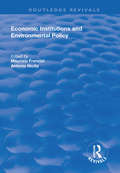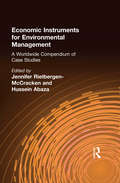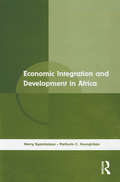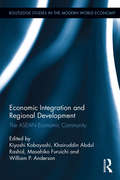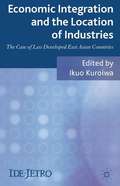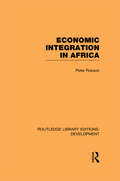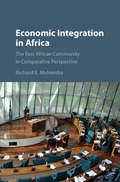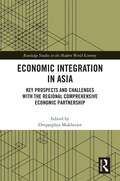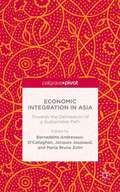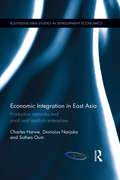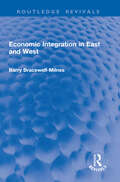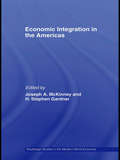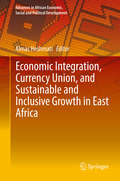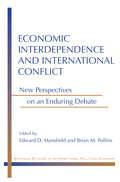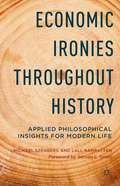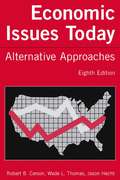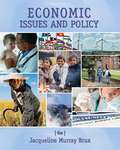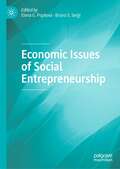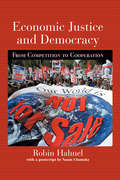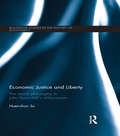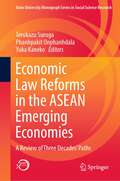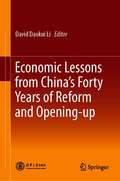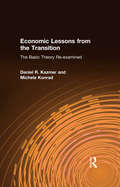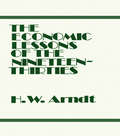- Table View
- List View
Economic Institutions and Environmental Policy (Routledge Studies in Environmental Policy and Practice)
by Antonio NicitaThis title was first published in 2001. This wide-ranging and comprehensive collection investigates the background to environmental economic development over the last thirty years, and the political implications of new directions resulting from technological and cultural changes in environmental issues. It examines the application of economic analysis to environmental problems in the past and solutions to the current issues of water, soil, air, energy, waste and urban ecology, discussing the implications of political decisions, cultural changes and technological constraints. It will prove a stimulating resource for students, academics, researchers and policy-makers alike.
Economic Instruments Of Security Policy
by Gary M. Shiffman James J. JochumEconomic turmoil has spread throughout the western world, but terrorists and other threats to national security were not put out of business by the Great Recession. "Economic Instruments of Security Policy" explores the critical question: do the United States and its allies still maintain effective economic tools to influence the behavior of those who seek to cause us harm? Governments have at their disposal many economic instruments to promote national security, such as sanctions, foreign aid, international trade, international finance and laws blocking funds for international terrorism. This book examines the use of theses economic policies and addresses how best to measure their effectiveness. "
Economic Instruments for Environmental Management: A Worldwide Compendium of Case Studies
by Jennifer Rietbergen-McCracken Hussein AbazaThis volume presents the results of a three-year collaborative effort involving research institutions in Africa, Asia, Europe and Latin America. Case studies demonstrate the diversity of environmental problems to which a variety of economic instruments can be applied - air and water pollution, packaging, deforestation, over-grazing, wildlife. They also show what is needed for them to work successfully and the pitfalls to avoid in introducing them, providing guidance for future applications. Written to be accessible to non-economists, the book offers source material for students and academic economists, as well as for professionals working with economic instruments.
Economic Integration and Development in Africa
by Mathurin C. Houngnikpo Henry KyambalesaThe debates over what African economic integration and development actually entails continue across international economic organizations, national governments and NGOs. Despite the glare of media attention and the position this issue has on international political agendas, few comprehensive accounts exist that fully examine why this process will be inevitable in the 21st century and how integration of national economies can be attuned to attaining the socio-economic goals and aspirations of member-countries. This book addresses this problem. It combines theory with application, enumerating the imperatives and initiatives governments will be forced to confront; providing insights for educators and students in African development, for policy makers in African governments, and for inter-governmental organizations.
Economic Integration and Regional Development: The ASEAN Economic Community (Routledge Studies in the Modern World Economy)
by Kiyoshi Kobayashi William P. Anderson Khairuddin Abdul Rashid Masahiko FuruichiWith a combined population larger than that of the EU or NAFTA, economic integration of the ASEAN states will have a massive impact on both the Asian and global economies. This book examines the ASEAN Economic Community (AEC) and its opportunities and challenges. It looks at the impacts of economic integration, trade structure and economic interlinkage among these countries through case studies. The book also utilizes theories to further examine areas such as trade, cross-border infrastructure, border management, and the regional development in terms of trade liberalization and foreign labor. This book also provides insight and analysis to developing policies for "ASEAN Connectivity". Given the challenges faced and huge potential impacts of the AEC’s cross-border project, this book will be of interest to policy makers, business leaders and researchers in the ASEAN region and throughout the world.
Economic Integration and the Location of Industries
by Ikuo KuroiwaA comprehensive picture of the effects of economic integration on industry location in less developed East Asia - particularly in Cambodia, Laos, Vietnam, and Myanmar - who pursued trade liberalization and economic integration after the 1990s. Studies include detailed empirical analyses of regional industry locations as well as country overviews.
Economic Integration in Africa (Routledge Library Editions: Development)
by Peter RobsonFirst published in 1968, this reissue is a study of contemporary international economic policy, with particular emphasis upon economic integration as a means of bringing about a faster rate of economic progress and of helping to overcome poverty. Peter Robson’s book is a study of the rationale of common markets and other forms of economic integration among African states and of their operation in practice. The book will be of great value to those concerned with administering or assessing integration schemes in Africa and indeed in less developed areas throughout the world. In addition, it is an important contribution to the field of development economics.
Economic Integration in Africa: The East African Community in Comparative Perspective
by Richard E. MshombaIn this work, Richard E. Mshomba offers an in-depth analysis of economic integration in Africa with a focus on the East African Community (EAC), arguably the most ambitious of all the regional economic blocs currently in existence in Africa. Economic Integration in Africa provides more than just an overview of regional economic blocs in Africa; it also offers a rich historical discussion on the birth and death of the first EAC starting with the onset of colonialism in the 1890s, and a systematic analysis of the birth, growth, and aspirations of the current EAC. Those objectives include forming a monetary union and eventually an East African political federation. This book also examines the African Union's aspirations for continent-wide integration as envisioned by the Abuja Treaty. Mshomba carefully argues that maturity of democracy and good governance in each country are prerequisites for the formation of a viable and sustainable East African federation and genuine continent-wide integration.
Economic Integration in Asia: Key Prospects and Challenges with the Regional Comprehensive Economic Partnership (Routledge Studies in the Modern World Economy)
by Deeparghya MukherjeeThe Regional Comprehensive Economic Partnership (RCEP) aims to achieve greater integration between the ASEAN region and its six free trade agreement (FTA) partners (India, China, Japan, Australia, New Zealand and Korea). The RCEP is the only agreement to include three economies which are among the seven biggest economies of the world—China, Japan and India. The book opens with an introduction to the current status of economic integration and factors that would affect it and looks at key issues like non-tariff barriers, evolving investment regulations in China (in the context of FTAs), connectivity initiatives to integrate the region, rules of origin in the context of value chain integration in selected sectors as well as region-specific aspects of South Asia and South East Asia which would shape the regional economic architecture going forward. With an attempt to cover key imperatives, the book concludes by noting primary impediments to easier trade and investment flows in the region, highlighting possible policy recommendations to improve economic integration.
Economic Integration in Asia: Towards the Delineation of a Sustainable Path
by Bernadette Andreosso-O’callaghan Jacques Jaussaud Maria Bruna ZolinThis study assesses the current state of economic integration in Asia - in particular in East and South East Asia- and analyzes the prerequisites for a sustainable path of economic integration, using the background of the EU experience as a benchmark.
Economic Integration in East Asia: Production networks and small and medium enterprises (Routledge-ERIA Studies in Development Economics)
by Sothea Oum Charles Harvie Dionisius NarjokoInternational production networks in manufacturing, particularly in machinery industries, have rapidly developed over the last two decades, resulting in dramatic increases in intra-regional and intra-industry trade, providing a key source of regional growth, integration and development in East Asia. This book provides a better understanding on how to effectively further increase SME participation in East Asian production networks, and in doing so identifies key challenges and issues that they need to address. This book aims to not only fill the theory-practice gap, but also to lay solid foundations for designing national arrangements and a regional institutional frameworks to further encourage and support SME engagement and participation in regional and global production networks. The book contains several country case studies and by drawing upon individual country experiences, at various stages of economic development, this book demonstrates the varying difficulty faced by SMEs in ASEAN member countries attempting to participate in regional production networks and highlighting differences in needs and policy priorities. This book offers both a more focused theme on the assessment of globalization and a rather unique approach by focusing upon the particular importance of SMEs, and by utilizing micro-level data at the firm or plant level. Its policy insights and the richness and uniqueness of the empirical findings will make the book an invaluable contribution to understanding East Asian production networks.
Economic Integration in East and West (Routledge Revivals)
by Barry Bracewell-MilnesEconomic Integration in East and West (1976) explores the logic of economic integration to form free trade areas and common markets, and applies the findings to the European Economic Community and Comecon, and to third countries and the world economic order in general.
Economic Integration in the Americas (Routledge Studies In The Modern World Economy Ser.)
by Joseph A. McKinney H. Stephen GardnerThis new book brings together contributions from recognized experts in trade policy, discussing and evaluating economic integration in the Western Hemisphere, the alternative trade strategies being pursued in this area and Latin American relationships with United States and Canada. These essays provide progress reports concerning the different regi
Economic Integration, Currency Union, and Sustainable and Inclusive Growth in East Africa
by Almas HeshmatiThis edited volume focuses on economic integration, currency union, and sustainable and inclusive growth in East Africa. It consists of twelve interrelated studies that provide a comprehensive picture of the state and determinants of economic development and cooperation among countries in East Africa, such as Burundi, Ethiopia, Kenya, Rwanda and Tanzania. The contributions are grouped into five parts: economic integration and its effects on trade; common currency and exchange rate; research, innovation, and knowledge, and shadow economics and corruption; inclusive and sustainable growth; and the conflict-growth nexus and reconstruction. This book will appeal to scholars and decision makers looking for the necessary tools and determinants of economic development and cooperation in East Africa.
Economic Interdependence and International Conflict: New Perspectives on an Enduring Debate
by Edward D. Mansfield Brian M. PollinsThe claim that open trade promotes peace has sparked heated debate among scholars and policymakers for centuries. Until recently, however, this claim remained untested and largely unexplored. Economic Interdependence and International Conflict clarifies the state of current knowledge about the effects of foreign commerce on political-military relations and identifies the avenues of new research needed to improve our understanding of this relationship. The contributions to this volume offer crucial insights into the political economy of national security, the causes of war, and the politics of global economic relations. Edward D. Mansfield is Hum Rosen Professor of Political Science and Co-Director of the Christopher H. Browne Center for International Politics at the University of Pennsylvania. Brian M. Pollins is Associate Professor of Political Science at Ohio State University and a Research Fellow at the Mershon Center.
Economic Ironies Throughout History
by Vernon L. Smith Michael Szenberg Lall RamrattanEconomics for Alfred Marshall, the last of the classical economists, is concerned with activities in the ordinary business of life. In that milieu, we find conflicts and chaotic behavior among people, firms, and countries, which make them conduct their affairs in different, and sometimes, ironic ways. Economic Ironies Throughout History explores, explains, predicts, and harnesses these ironies for economists and scholars alike. Szenberg and Ramrattan distill their core economic ironies from a vast history of philosophy and literature that applies to economic thought. They include philosophical, psychological, literary and linguistic discussions and the personalities behind those ideas such as Socrates, Kierkegaard, Hume, Freud, Jung, Saussure, and Barthes. This book is ideal for economists as well as scholars across the business, social science, and humanities fields.
Economic Issues Today: Alternative Approaches
by Robert B. Carson Wade L. Thomas Jason HechtWritten in non-technical, everyday language that is accessible to the undergraduate audience, and requiring no background in economic analysis, this acclaimed text provides a unique approach to understanding what the practice of economics is all about. The authors address fourteen current economic issues, covering both micro- and macro-economics, and offer analyses and proposed solutions for each from Conservative, Liberal, and Radical perspectives. This new edition incorporates critical changes in economic policy since the last edition that affect every issue covered in the text. Tables have been updated throughout to include current economic data, and an all-new section on social policy frames the current debate about the Social Security system. The book's unique approach stimulates critical thinking on everyday issues that traditional texts either ignore or present as "settled" debates. It helps students to understand the dual role that ideology and logical/empirical argumentation play in economics. Issues are presented as stand-alone subjects that can be read in any sequence and used to supplement a wide range of principles of economics texts. An instructor's manual with a test bank and discussion questions is available to professors who adopt the text, and Power Point downloads are available as teaching aids. The text is also available in two separate volumes: Microeconomics Today and Macroeconomics Today.
Economic Issues and Policy (Sixth Edition)
by Jacqueline Murray BruxSignificantly revised to reflect the sweeping changes in today's economy and government, the 6th edition of ECONOMIC ISSUES AND POLICY provides you with a solid, practical understanding of basic economic tools as you analyze important economic issues and related policy perspectives. This edition presents economic theory within a simple, market-oriented framework at a level of technicality that is deliberately appropriate for a basic first course in economics. Complex topics are excluded or presented within appendices. The book effectively balances liberal and conservative economic viewpoints while analyzing contemporary economic situations and the implications of emerging policies. Global and multicultural features and discussion questions encourage you to become involved in the economic issues being discussed.
Economic Issues of Social Entrepreneurship
by Elena G. Popkova Bruno S. SergiSocial entrepreneurship is one of the most controversial actualities of the modern economy. On the one hand, social entrepreneurship makes up for "market failures" and prevents the deficit of socially essential goods and services in the marketplace, acting as their supplier. On the other hand, the survival of social entrepreneurship in an aggressive market environment is a challenging task, the fulfilment of which may distort the original essence of social entrepreneurship. Comprising a collection of research presented at the International Scientific Conference Advanced Issues on Social Entrepreneurship, this contributed volume offers a global economic analysis of social entrepreneurship. Whilst social entrepreneurship is indispensable to the modern economy, the current controversial model of its organization means it cannot fully accomplish its mission. This book offers potential solutions to this problem with the global and national strategies of economic growth and social progress. It includes a focus on emerging markets, in which the role of social entrepreneurship is especially high. This book is aimed at scholars and students who are interested in social entrepreneurship and corporate economics, and practitioners involved in this field. It will also be of interest to policy makers in the development and implementation of a national economic policy for support for social entrepreneurship in emerging markets.
Economic Justice and Democracy: From Competition to Cooperation (Pathways Through the Twenty-First Century)
by Robin HahnelIn Economic Justice and Democracy Robin Hahnel argues that progressives need to go back to the drawing board and rethink how they conceive of economic justice and economic democracy. He presents a coherent set of economic institutions and procedures that can deliver economic justice and democracy through a "participatory economy." But this is a long-run goal; he also explores how to promote the economics of equitable cooperation in the here and now by emphasizing ways to broaden the base of existing economic reform movements while deepening their commitment to more far reaching change.
Economic Justice and Liberty: The Social Philosophy in John Stuart Mill’s Utilitarianism (Routledge Studies in the History of Economics #157)
by Huei-chun SuThis new book reopens the debate on theories of justice between utilitarian theorists and scholars from other camps. John Rawls’ 1971 publication of A Theory of Justice put forward a devastating challenge to the long-established dominance of utilitarianism within political and moral philosophy, and until now no satisfactory and comprehensive utilitarian reply has yet been put forward. By expounding John Stuart Mill’s system of knowledge and by reconstructing his utilitarianism, Huei-chun Su offers a fresh and comprehensive analysis of Mill’s moral philosophy and sheds new light on the reconciliation of Mill’s idea of justice with both his utilitarianism and his theory of liberty. More than a study of Mill, this book uses a systematic framework to draw a comparison between Mill’s theory of justice and those of John Rawls, Amartya Sen, and Friedrich von Hayek. It hence establishes common ground between different schools of thought in the fields of economics and philosophy, and enables more effective dialogue. This book will be indispensable both to those interested in Mill’s moral philosophy and to those seeking a solid theoretical basis for analyzing the idea of justice, as well as to anyone with an interest with the history of economics, economic philosophy and the history of economic thought more generally.
Economic Law Reforms in the ASEAN Emerging Economies: A Review of Three Decades’ Paths (Kobe University Monograph Series in Social Science Research)
by Yuka Kaneko Terukazu Suruga Phanhpakit OnphanhdalaThis book reviews the periodic changes in the legal policies of the late-developing ASEAN countries, often known as the CLMV countries (Cambodia, Laos, Myanmar, and Vietnam), in their continuous path toward globalization after the collapse of the socialist bloc. The book also identifies the characteristics of the legal reforms in their present stage guided by the common framework under the ASEAN Economic Community (AEC) moving toward 2025.The first stage is illustrated by the ASEAN-style utilization of foreign investments as reflected in all investment laws and policies of CLMV countries in the 1990s, which featured entry control (as “sticks”) and investment incentives (as “carrots”). Those controls and incentives were the means to induce investors to assume various performance requirements to contribute to industrial policies. The second stage witnessed a shift toward enhanced liberalization as an endeavor toward the WTO accession during the 2000s, as seen in the integrated investment laws that appealed for the national treatment of foreign investors. At the same time, those investment laws emphasized the substantive provisions (e.g., fair and equitable treatment and indirect expropriation) and procedural protections (e.g., provision of Investor–State Dispute Resolution mechanisms) as an appeal for stabilization of the investment climate. The third stage of legal policy, as evidenced by the recent amendments to the investment laws, is newly focused on environmental and social considerations, which seems to be an indispensable response to the increasing social protests against the negative impacts of investment promotion. Simultaneously, the means of administrative controls over investors, established in the first stage, are uniquely utilized for the realization of new goals.
Economic Lessons from China’s Forty Years of Reform and Opening-up
by David Daokui LiThis book first shows that the past 40 years of China's economic reform and opening up represents the greatest magnitude of economic growth in history. Based on field trips, extensive and intensive interviews and literature surveys, this book argues that there are five general lessons for a rapid growing economy from China's economic reform and opening up, all in the area of the relationship between the government and the economy. First, the local governments need to be incentivized to help rapid entry and development of enterprises. Second, local governments need to be incentivized to help rapid land conversion from agricultural to non-agricultural. Third, financial deepening is vital; that is, inducing households to hold more and more financial assets in local currency. Financial deepening is essential to convert savings into investments. This requires financial stability, which is crucial. Fourth, the learning through opening up is the key to endogenous economic growth. The fundamental benefit of opening up is learning rather than enjoying comparative advantage. The fifth and final lesson from China is that the central government must proactively manage the macroeconomy. The rationale is that enterprises compete with each other in games of industrial organization. In order to resolve this problem, proactive measures including market-oriented means, administrative orders and reform measures should be implemented. Overall, the main lesson from China's past 40 years of reform and opening up is that proper incentives and behavior of the government, local and central, are important for economic growth. China has been conducting reforms in this regard and as a result, the government more or less has been playing the role of a "helping hand" regarding economic growth, although China's economic system is far from perfect and many reforms are still needed.
Economic Lessons from the Transition: The Basic Theory Re-examined
by Daniel R. Kazmer Michele KonradEconomic Lessons from the Transition focuses on major transitions in the 1990s: the transition from central planning and communism to market capitalism and the global integration of national financial systems. The transitions were supposed to raise most peoples' standard of living; instead they dramatically worsened the lives of most people in the countries involved. While most attempts to explain this failure focus on policies, the authors of this book argue that failure of economic theory to fully understand these transitions has led to bad policies that made the transitions unnecessarily painful and costly. The book suggests answers to the following questions: How should basic economic theory as taught in introductory economics courses be revised in light of the failure of market-oriented economics to effect a successful transition in so many former communist economies? Could the theory be revised and presented in a different manner? How can basic economic theory be used to help explain the past failures in understanding transition problems and to avoid future mistakes? This volume is a "must read" for all who teach economics or apply economics to the real world.
Economic Lessons of the 1930s (Modern Revivals In Economic History Ser.)
by H. W. ArndtFirst Published in 1963. Routledge is an imprint of Taylor & Francis, an informa company.
